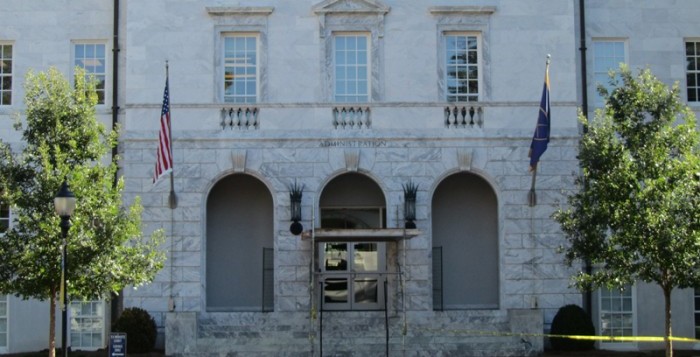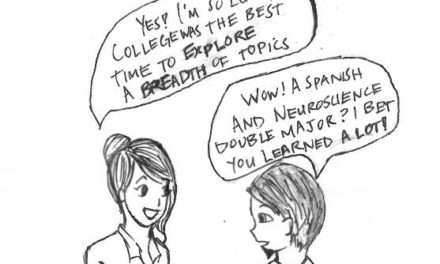Last week, for the first time in over two decades, Emory University fell out of the top 20 in the venerable U.S. News and World Report (USNAWR) rankings. Although the drop from 20 to 21 is superficially trivial, it is of great symbolic significance given that many students, parents, academicians and college administrators rely on the “top 20” as a rough benchmark for university quality. But does the drop in the rankings really matter?
In one respect, the answer is “Probably not.” Objectively, the fall-off from 20 to 21 is minor and is plausibly attributable to measurement error and slight shifts in the USNAWR criteria each year. What’s more, Emory may well be back in the top 20 next year or soon thereafter. Moreover, as scores of critics have pointed out, the USNAWR rankings are hardly infallible.
They reflect a debatable formula that itself reflects an arcane composite of dubious metrics. Plus, what’s to complain about? After all, we at Emory are blessed with a lovely campus in a thriving city, a talented student body, many gifted researchers and teachers, bountiful resources and a distinctive mix of a liberal arts and research atmosphere.
Yet, in other ways, the rankings drop is indeed a big deal. Much as the Emory administration is loath to admit it, these rankings impart a sobering reality: Emory is a good university, but not a great one. To be sure, many interesting and exciting things happen here. But compared with the Ivies, Stanford, MIT, Cal Tech or the University of Chicago, cutting-edge discoveries and breakthroughs at Emory tend to be few and far between. Furthermore, like it or not, rankings create reality at least as much as they reflect it. If our rankings continue to stagnate or drop, Emory will find it increasingly difficult to attract the same cadre of high-caliber students and faculty that it has become accustomed to attracting. Incidentally, the USNAWRrankings are hardly alone in raising a red flag concerning Emory’s reputation. Recently, while waiting for a flight at Hartsfield-Jackson airport, I watched a brief video welcoming visitors to Atlanta. As the narrator, Atlanta mayor Kasim Reed, boasted of Atlanta’s “world class universities,” footage of Georgia Tech and Morehouse flashed on the screen. Emory was nowhere to be seen. Imagine a comparable video of the Boston area neglecting to feature Harvard or MIT, or of St. Louis neglecting to feature Washington University. It would be inconceivable.
The administration is quick to point that the drop from 20 to 21 is of no great import. As is its wont, Emory has valiantly attempted to put the best possible “spin” on the new while turning a blind eye to its implications. As I write this column, the Emory website proudly displays a story trumping the headline, “U.S. News Ranks Emory among top national universities” while neglecting to inform visitors of our disappearance from the top 20.
Still, the crucial question is not why Emory fell one slot this year. Instead, the question is why Emory has gone essentially nowhere – except slightly down – in the rankings over the past 25 years while several of our peers, such as Duke and Vanderbilt, have increased in the rankings. When I first joined the Emory faculty in 1994, our university was ranked 17th in USNAWR. It was a time of enormous excitement and anticipation, and there was widespread talk of Emory being “poised for greatness.” Twenty years later, many Emory faculty members are pessimistic that the words “Emory” and “greatness” will ever appear in the same sentence. Why?
The answer is self-evident to all of those who have followed Emory closely over the past few decades: Emory has not invested sufficiently in academic excellence. Despite the fact that Emory’s endowment has rebounded and its capital campaign has been strikingly successful, the hiring of new faculty members in the College has slowed to a virtual trickle. Partly as a consequence, the Emory faculty-to-student ratio has climbed from seven to one to eight to one. Fueling the problem, the university has invested much more heavily in Emory HealthCare than in the College, meaning that the hiring of outstanding college faculty has taken a back seat. In addition, for five years in a row, the average college faculty raise pool has been a measly one percent or less, affording department chairs scant leeway to differentially reward faculty members for hard work and scholarly excellence. Not surprisingly, many of our best and brightest faculty members have descended into a state of learned helplessness, apathy and resentment.
To be clear, the fault cannot be laid at the feet of Dean Robin Forman, who appreciates the problem but can only do so much given the limited financial hand he has been dealt. Instead, as the saying goes, to get the bottom of the problem, we must get to the top of it.
The source of the problem lies squarely with the Emory higher administration, especially President James Wagner, who certainly has Emory’s best interests at heart, and the Board of Trustees. They have been good stewards of Emory’s finances, but it is less clear that they have been good stewards of Emory’s scholarly future. In many ways, our steady decline in the USNAWR rankings can be viewed as a referendum on their policies. Specifically, the President and Board of Trustees have neglected to grasp the two greatest impediments to Emory’s excellence: complacency and risk aversion.
Emory’s complacency has been apparent in an absence of urgency on the part of the higher administration. Although Emory has an admirable strategic plan for faculty growth, it will be difficult to sustain without a tangible financial commitment. The same sense of self-satisfaction is evident among the Board of Trustees. When current Chair of the Board of Trustees John Morgan took over last year as the new Chair of this board, he stated that “Emory doesn’t need to ‘change’ who we are to move into the future…Who we are is exactly who we should be.”
This attitude is short-sighted. To take merely one example, the Emory College faculty is remarkably top-heavy. To some extent, this is a nation-wide problem, but it is especially acute here. In my own department of Psychology, out of 32 tenure-track faculty members, only two are assistant professors. The substantial majority of our faculty members are in their 60s and 70s and will be retiring within the next decade. This trend, which is mirrored in numerous Emory college departments, is a recipe for disaster. The impending deluge of lost faculty slots, which will almost surely occur unless Emory invests massively in future faculty hires, will inevitably diminish its intellectual atmosphere, scholarly quality and reputation.
Emory’s second great enemy, risk-aversion, is the bedfellow of complacency. Over the past several decades, the Board of Trustees has been economically conservative, consistently declining to take courageous steps to boost the university’s scholarly excellence. Compare Emory ostrich-like approach to its impending retirements with that of Cornell University, which several years ago launched a massive multi-million dollar initiative to replace the faculty members anticipated to retire over the coming decade.
Of course, some Emory faculty members might see all of this as irrelevant. They may be content to teach at a high-quality and comfortable university that largely rests on its laurels and that does not expect more of them. Even so, the Emory student body should care. If Emory does not act decisively to reverse the continued stagnation and potential decline in its rankings, the value of an Emory degree may ultimately be downgraded, and along with it, the quality of our faculty and student body.
When faculty members have asked Emory administrators to explain its lack of investment in current and future faculty excellence, the latter have almost always replied with complicated – and at times convoluted – financial explanations that few of us can understand. Enough of that. Emory is an institution of higher learning, not a corporation. It is high time for the Emory administration and Board of Trustees to display bold leadership and to stop expecting its students and faculty to remain content with the status quo. The Emory community deserves better.
– By Scott O. Lilienfeld, Samuel Candler Dobbs Professor of Psychology
The Emory Wheel was founded in 1919 and is currently the only independent, student-run newspaper of Emory University. The Wheel publishes weekly on Wednesdays during the academic year, except during University holidays and scheduled publication intermissions.
The Wheel is financially and editorially independent from the University. All of its content is generated by the Wheel’s more than 100 student staff members and contributing writers, and its printing costs are covered by profits from self-generated advertising sales.







Vander
from the mouths of Guests
Oh man my santa hat is looking sharp, if a bit unseasonal
Now let’s see if the hat in my previous comment will disappear, just as it did the time before, when I replied to my own comment…
now all the santa hats are gone…
Vanderbilt is hardly a good peer to compare us to. Their SAT’s have increased maybe over 100 points and they have only increased a spot or 2 in the rankings, so clearly they are not doing that much either. Their increase in the rankings can almost only be solely explained by increased cherry-picking of SAT scores (the scores are a bit higher than Duke’s and perhaps several schools that are indeed better than it). In addition, despite Emory being way below it in SAT scores, it generally generates the same amount of (or more) Fulbrights (and other national scholars) as Vanderbilt each year. This year we had 8 and they 6. We don’t want to emulate whatever Vanderbilt is doing. I would rather focus on what Duke is doing. Whatever they have done has led to progress that goes far beyond the USNews Rankings and has propelled them into the top of world rankings as well. The issues you cite are important to putting Emory on a trajectory where we improve things that matter. We don’t want to settle for “keeping up” with schools at the level of Vanderbilt in the USNews rankings (note that we often go back in forth in world rankings). The academics for undergraduates are already on par or are better than theirs (as evidenced by the fact that we can keep up with them or outperform them despite having SAT’s 100-120 points lower). Other peers are indeed doing much better indeed because of the reasons you put forth. And this idea that this will cause us to lose the caliber of students we have been getting is absurd. The caliber of Emory students has been quite below the other private top 20s for a while now and the rank just not caught up to it. The stagnant (and maybe even declining) selectivity can perhaps explain part of this drop which was probably long overdue. Emory has never been great as great at recruiting and marketing to prospective students as other top privates and it shows. I would say that we are extremely lucky to have gotten the two freshmen who had enough ambition and creativity to come up with the Ebola testing idea. That isn’t very common to recruit students with that level of passion and drive as a freshman. Most just settle for simple ideas and making good grades in their classes. Some other top schools already draw students like International Olympiad winners, Seimens Westinghouse winners, and students that come in with academic fellowships (from external sources) for having talent in specific disciplines already. How many students like that does Emory actually yield? Not but so many, if any. We do yield students with high grades and SAT scores (people who have the drive and income to jump through hoops), but don’t get the idea that we were yielding much cream of the crop beyond that notion of excellence.
If we were, students would be demanding the excellence you are demanding. Seriously, students at Harvard will willingly and readily critique the teaching of a Nobel Laureate in the Harvard Crimson (you can go on there and see some articles). Do you ever hear Emory students hitting the Wheel to critique the level of teaching and rigor of anyone’s course in the Wheel? No, because they don’t really care enough about the academics to critique in such a public venue. We’d rather stick to ratemyprofessor or something. When do you see papers like the Wheel highlight things like curriculum changes and updates going on in certain departments? Never. You see this often at very elite schools where the students are aware of what is happening to the academic environment and actually care about how it effects them. Students, like the administration, seem to be fine with the status quo or whatever happens academically. The administration can get away with not investing in adding faculty when students are not aware or simply do not care.
Thank you. This voices my concerns exactly. I have written to the Wheel multiple times during my time at Emory to request that I’d like to know the inner workings of the academy and how Emory is doing as a scholarly body. I’ve gotten no replies. It’s as if Emory students care not to report on such things. I want a student body who wants to take an active role in shaping the community. Often times I have found that Emory students never follow through on projects or initiatives that would make a real impact (and this is often seen with Emory as an organization too). Not to mention, Emory students don’t always see faculty as colleagues and are afraid to challenge them. It reinforces this “I go to college because that’s just what you do at my age” type of thing. People aren’t invested in Emory as a provider of knowledge and because administration is complacent, the problem is compounded.
Are Oxford’s statistics part of the ranking decline?
Probably not. Either way, thinking of Oxford as part of the problem is losing sight of the even larger issue IMHO.
The Oxford student profile is nearly identical (in terms of SAT/GPA/Class rank) as the Emory college student profile.
So they are submitted for US News and counted as freshmen?
Plus, you know, Emory falsified the data it sent to US News for over a decade, which may have artificially inflated its position in the rankings. Maybe sub-20 is where we were meant to be all along. http://www.bloomberg.com/news/2012-08-18/emory-says-it-inflated-students-entrance-exam-scores.html
I agree with Dr. Lilienfeld’s observations, most specifically Emory’s fear of risk-taking. This fear is not limited to the Board of Trustees (although, I may state, is arguably the worst offender); it permeates department on department. I consider myself lucky to have as much interaction with top administrators as I do – yet recognize that some feel trapped in their positions. Some have the courage or the means to push the envelope, yet, many are restricted as to what they can accomplish.
To be frank: the purpose of USNAWR rankings is to be able to advertise your rank to attract students to your university. The top universities on the list have a true “students first” mentality, and I cannot in good conscience say the same about Emory. Widespread complaints about departments and professors fall on deaf ears (leading to students transferring or switching majors), students must cut through immense amounts of red tape to accomplish much of anything non-academic, and even the most basic support – medical and psychological – is provided in a manner that makes many students feel as if they are perceived as an inconvenience.
Academic and research revenues compose roughly 33% of Emory’s overall revenues, where the other 67% come from Emory Healthcare. 25% of Emory’s academic and research revenues come from tuition and fees while research revenues pop slightly higher, at 27%, composed mostly of grants. The majority of remaining revenues are from investment income and contributions. Think about it – nearly a quarter of our revenue comes from student funds. Yet, Dr. Lilienfeld is correct in his note that Dean Forman is trapped within his budget. Perhaps if we started evaluating the budget on the whole, a complete top-to-bottom review, and made some hard decisions, we would be better off. Some people might not be happy, but consider the greater good. The department reductions announced in Fall 2012 were a good start, but we need to be more courageous in pushing that even further.
Don’t get me wrong – I love Emory now, and always will. At the same time, though, I have spent a very large amount of my time working and serving on committees in the college and business school, in divisions such as housing and dining, to make Emory even better. I work with incredible people who do have a “student first” mentality. Until that mentality is felt higher up, though, Emory will not be able to attract the high (and demanding) calibre of students that it seeks to enroll.
Although I like the spirit of your comment and agree with many of the points (especially the red tape part), I do not believe the department changes in 2012 were a good move. From a purely democratic standpoint, they were a nightmare — and they received national attention. No wonder no stellar up-and-comers want to work at Emory under the administration; they could never get anything innovative done anyways. See the Computational and Life Sciences Initiative Emory started about 10 years ago. There hasn’t been any movement in that area for a while and faculty are actually moving AWAY from Emory. Sure, they’ve added researchers, but they haven’t benefitted the College in anyway.
In addition, the department cuts tore through departments that represent a large percentage of minority faculty and creative students. If Emory wants to attract creative and big thinking students of any kind (sciences, arts, humanities, etc.) they need to stop ripping apart its creative core. We shouldn’t be a pre-business, pre-med first college. It’s definitely perpetuating the “risk aversion” mentality and really taking away from the intellectual environment.
Is anyone concerned about the drive for more tuition dollars for the College. For example, enrolling international students that comprise 20% of the student body, coming primarily from China, and coming from rich families and no economic diversity? Or half the freshman class coming from Early Decision-clearly favoring rich families who don’t need to shop around for college? Where is the discourse on these issues and what they are doing to the student body? Why isn’t the Wheel digging into these issues?
It clearly wants to dodge some controversy associated with criticizing the administration or admissions dept. heavily. Again, anti-risk like the student body.
Also, one could easily argue that the increased enrollment is in response to this drive for more tuition dollars you allude to. The undergraduate enrollment has grown by about 1000 or more in less than 10 years. This increase in enrollment costs in terms of quality of students we get, strain on space (larger class sizes and a need to more carefully consider more upperclassmen housing options after catering almost exclusively to the growing freshman class for too long) and allocation of resources. This drive for tuition dollars/”more revenue” has perhaps led to some good things like solid Maymester courses, but has led to questionable things such as the things you mention and just a general decision making scheme that is overly hasty and lacking in planning.
Private colleges in general do a terrible job of economic diversity. I kind of laughed at the NYT article published a week ago on the “success” of private universities in enrolling a socioeconomically diverse crowd. As someone who is from said bracket, I can say that I don’t see as much skew towards rich pedigrees as I would at a place like, say, Stanford, but I see where you’re coming from, and it will probably get worse over time. This drive for tuition dollars is something all colleges do, but few students care to tackle head-on, mostly because it doesn’t really affect the majority of students – especially here at Emory, or anywhere in the top 25.
Sidebar: Then you’ll have factions of kids that believe that because they’re paying full tuition (actually, their PARENTS are paying full tuition) that they’re supporting your way through college (this is literally an ancedote of someone I’ve encountered at Emory). This breeds classism in general. But the College doesn’t care, so long as they get their 50-60% who pay full tuition!
That’s nice…..I understand the barriers to formally complaining about academic quality, but you would think Emory students who pay this amount of money would have enough guts to at least put such things on blast in the wheel. Again, no one cares enough to be vocal or raise some hell about it in a very public forum. We’d rather complain about the state of Greek life, housing, recreation, and food quality (IE social environment things). Not the types to complain about academics in a forum that could attract a large degree of attention. This may be perhaps because students fear what complaining publicly about such things may do to their reputation in the eyes of faculty and departments (or worse, their grades), but they do pay about 5-7k for many courses. Again, students at several other elite schools discuss issues of the academic environment quite often (Harvard students have even designed a whole handbook on describing courses. Yale has or had a whole publication/website dedicated to navigating the academic/social environment there) and openly. Beyond grades, the quality and nature of the academic environment here seems almost trivial at Emory in comparison to other leading leading institutions. This could be because of a less intense intellectual vigor or several other reasons. Articles and descriptions of innovative or interesting courses or professors seem often not featured in the Wheel (except via the column where someone describes their major or passing mentions of certain instructors in random articles) by students themselves so much as by other faculty members in things like the Emory Magazine. For example, you don’t see at Emory, any Wheel member or student hitting up the Chemistry Department asking about the exact changes the department plans to make to the curriculum, yet when Harvard changes its intro. biology course to Life Sciences 1a, it hits top publications focusing on science education. The Duke Chronicle featured several articles about how its introductory biology course was reformed, and we can’t find out or are not willing to even inquire about a whole science department’s introductory curriculum structure being altered. There was hardly a fuss on the articles a while ago (2011?) about what departments and faculty members were doing to prep students for the new MCAT, and some faculty members just said in the article: “We should just wait and see what to do when it happens” (and then you had Escobar claiming that we don’t even know if the change would happen. Now that was amazing if you ask me. It was well confirmed that the change was happening by then). Given how big pre-med is big at Emory, if academics and the training students receive is held at such a high level importance, why are there not even conversations or an article in the Wheel asking about what certain science depts are doing differently to help better prep students for a more intense MCAT? No one cares, people just take it on faith that what we have is “good enough” and that a nice test prep class will erase any deficiencies (obviously it isn’t or else the placement rates would be better and the scores on the current MCAT would be better)? We don’t even discuss academics that could be easily held accountable through performance of students on commonly taken standardized tests, lets not talk about other departments that can’t be as easily assessed…